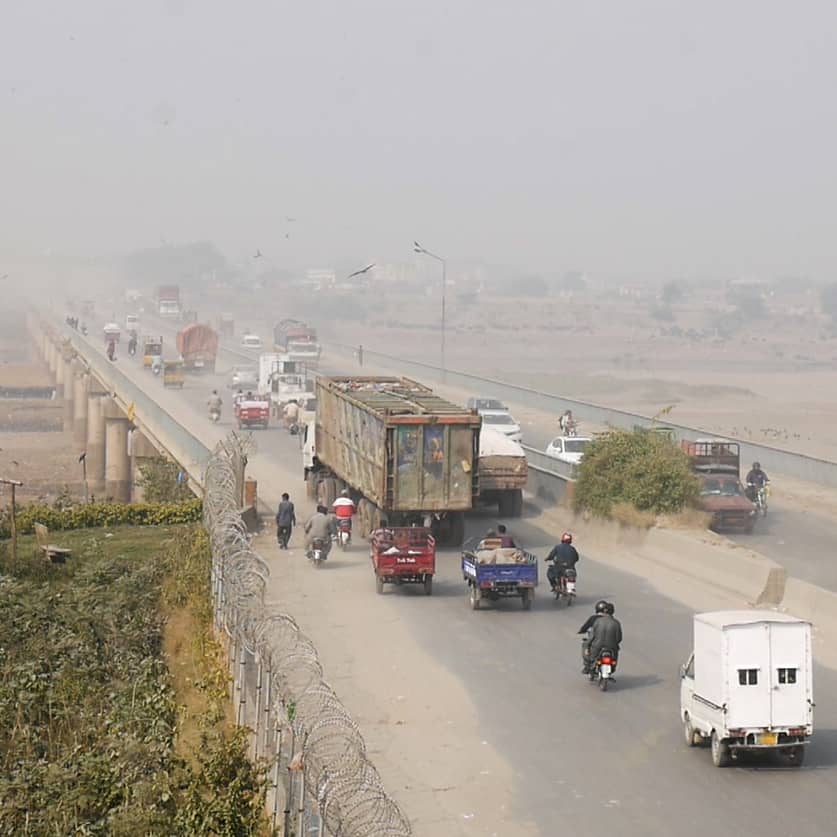Punjab Minister for Environment Protection Muhammad Rizwan has recently sent a letter to the provincial head of the Federal Investigation Agency (FIA). It contains the request that “any person/company issuing data on social media/internet without the approval of EPA [Environmental Protection Agency] be closed down and action be taken [against them] under Cyber Law.”
The letter, issued on November 16th, 2021, alleges that “some scrupulous elements with the malafide intention are trying to damage the image of Pakistan”. This is being done by disseminating “misleading and inaccurate” information gathered through different unauthorised sources which contradict the data gathered by the Environmental Protection Department (EPD), it states.
The letter was written, perhaps, in reaction to the findings of IQAir — a Swiss organisation specialising in monitoring air quality and airborne pollutants worldwide — which has declared Lahore as the most polluted city in the world more than once since early November 2021. For a few days, it reported that the air quality index of Lahore was two-times more hazardous than that of the city listed as the second most polluted place in the world.
After the minister’s letter was sent out, assistant director of the Environmental Protection Department in Sahiwal district, Yunus Zahid, issued a notification to general public in his jurisdiction. In this, he stated: “I have been advised to direct you to stop sharing AQI [Air Quality Index] through any social media or internet/web applications of print media to the public.”
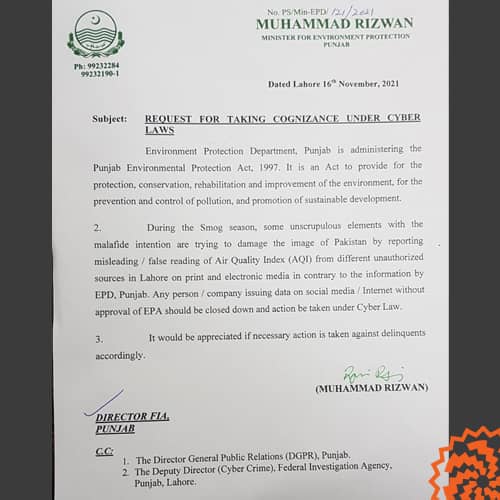
Simultaneously, he directed the public to remove all the air quality-measuring devices from their homes because of the following reasons:
1) Privately-installed instruments for measuring air pollution are unauthorised and illegal and the data obtained from them is not validated and standardised through an authentic measurement method.
2) Measuring the quality of air pollution and releasing related data is the exclusive authority of the State.
3) The Air Quality Index device may be used to collect data for personal use only.
4) Unauthorized entities or individuals cannot release unauthentic data—which may create a panic among the masses—because it constitutes Cyber Crime.
All these orders sound ridiculous to Dawar Butt, a researcher working on air pollution. In the first place, he says, there is no law in Punjab which makes it binding upon individuals and businesses to get permission from the government before installing any air quality measuring devices. Secondly, he contends, there is no provision in the Prevention of Electronic Crimes Act 2016 which describes the dissemination of the data related to air quality as an anti-state propaganda.
Regardless of these legal aspects, the provincial government itself seems to agree with the ranking of Lahore as the most polluted city in the world. In a notification issued on November 22nd, 2021, Punjab Relief Commissioner Babar Hayat Tarar stated that there are “evidences of persistent deterioration in Air Quality Index of the city of Lahore.”
He also said the provincial cabinet, in its 36th meeting (held on October 6th, 2021), termed smog in Lahore as a “calamity” and stressed the need for taking measures in the whole province in general and in the provincial capital in particular “to put a leash on deteriorating air quality index”.
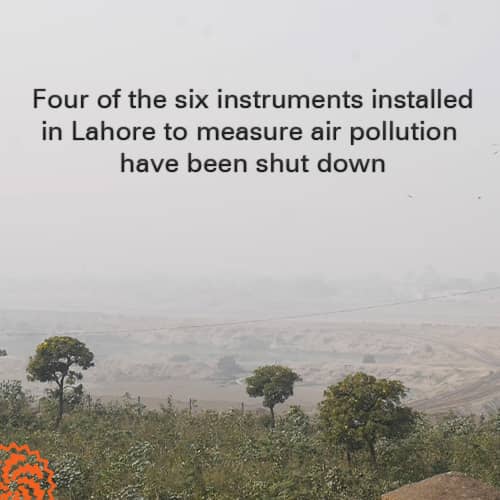
In pursuance of the cabinet’s recommendations, Tarar ordered through the same notification that, in addition to weekly holidays (Saturday and Sunday), all non-government offices and public and private sector educational institutions within the territorial jurisdiction of Lahore Metropolitan Corporation shall remain closed on Mondays. Nevertheless, he said, the employees of all such offices may work from home and students may arrange to attend virtual classes on Mondays.
His directive came into force on November 27th, 2021 and will remain effective till January 15th, 2022.
This announcement of a three-day weekend is aimed at reducing the use of transport in Lahore. This is because environment experts are of the firm belief that carbon emissions from vehicles are a major contributor to the hazardous levels of air quality in the city.
State vs people
Sheraz Zaka is a Lahore-based lawyer. As a counsel, he has pleaded a number of cases in front of the Lahore High Court to seek an end to air and water-borne pollution in Lahore. Commenting on the orders of the provincial government, he says: “On the one hand, the government has declared air pollution as a ‘calamity’ mainly relying on the data collected by private companies and individuals while, on the other hand, the Environmental Protection Department is declaring these same numbers as unauthentic and illegal.”
He then argues that “it is, indeed, the responsibility of the Environmental Protection Department to provide regular and timely data on air pollution [but] it has consistently failed to do so.” This failure, he contends, justifies why Punjab’s citizens need to keep monitoring the level of pollution on their own.
The main reason behind the government’s failure to do so, according to Zaka, is “that the air quality index devices installed by its environment department are either suspiciously switched off on the most polluted days or the data acquired from them is not released regularly.”
Also Read
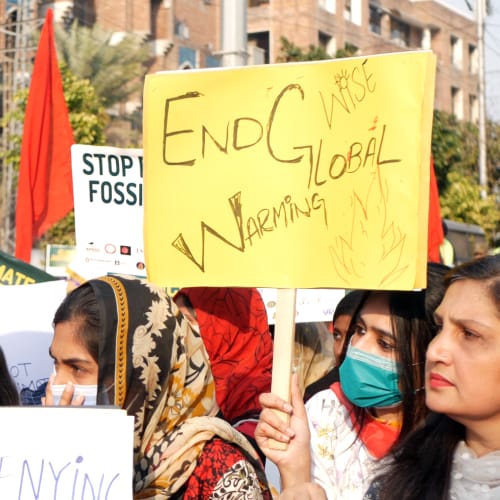
The global conference on climate change: Will the developed countries honour their pledges?
In such a scenario, he argues, the government’s attempt to declare the dissemination of data collected by individuals and private companies as an offence is essentially a bid to make people believe, though falsely, that “all is well.”
Dr Sanwal Nasim, an assistant professor at the Lahore University of Management Sciences (LUMS) and a researcher on environmental pollution, also describes the government’s measures against air quality measurement by individuals and private companies as “unbelievable and irresponsible.”
“If doing so is illegal”, he asks, “can we then trust the data released by the Environmental Protection Department because the devices it has installed mostly remain switched off?”
Yunus Zahid, who works with the same department, corroborates Dr Nasim’s observation. “Four of the six devices installed by the government to monitor air quality index in Lahore are out of order due to technical faults while the other two also develop errors every now and then,” he says.
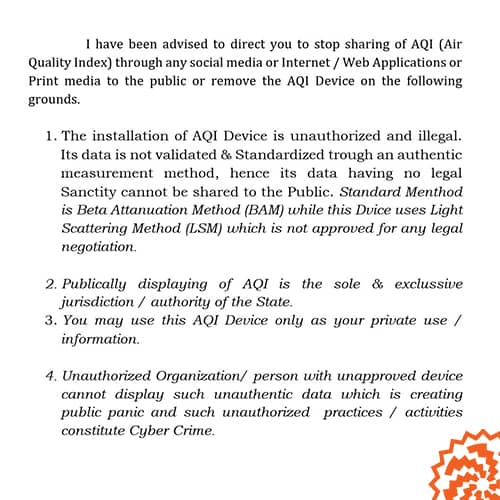
Still, he does not approve of the unofficially-installed equipment. “[Mostly] imported from China, these cheap meters also show humidity in the air as pollution. The data collected through these devices, therefore, exaggerate the poor quality of air,” he says.
Butt responds to this by saying that the performance of these devices has nothing to do with their price and where they come from. Declaring them altogether defective is like saying that “the voice quality of China-made Huawei cell-phone does not match with that of the US-made iPhone because the former is cheaper than the latter.” The China-made devices, he says, “estimate the amount of pollution and toxic particles in the air mostly as accurately as any other device.”
He also says the information about air quality that is broadcast and printed in the media is generally released by the international organization, IQAir. “This information is based on data sent by private, government and para-state organisations and individuals from across the world,” he explains.
Butt elaborates this by saying that IQAir collects all the data coming from different parts of a city or an area and then analyses it through a mathematical formula. It is after this analysis that “cities and areas are classified in terms of their air quality index”.
Published on 22 Dec 2021
